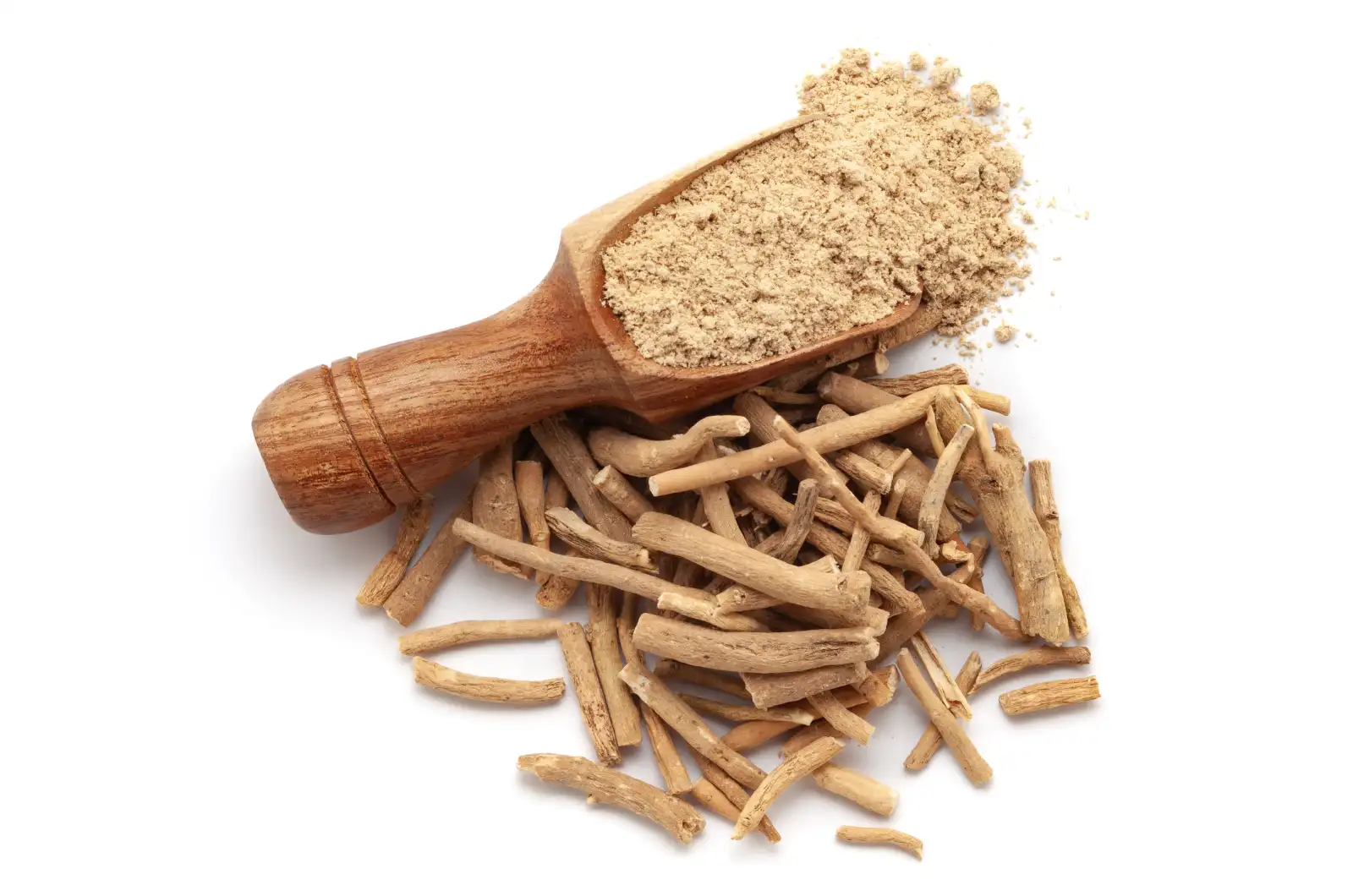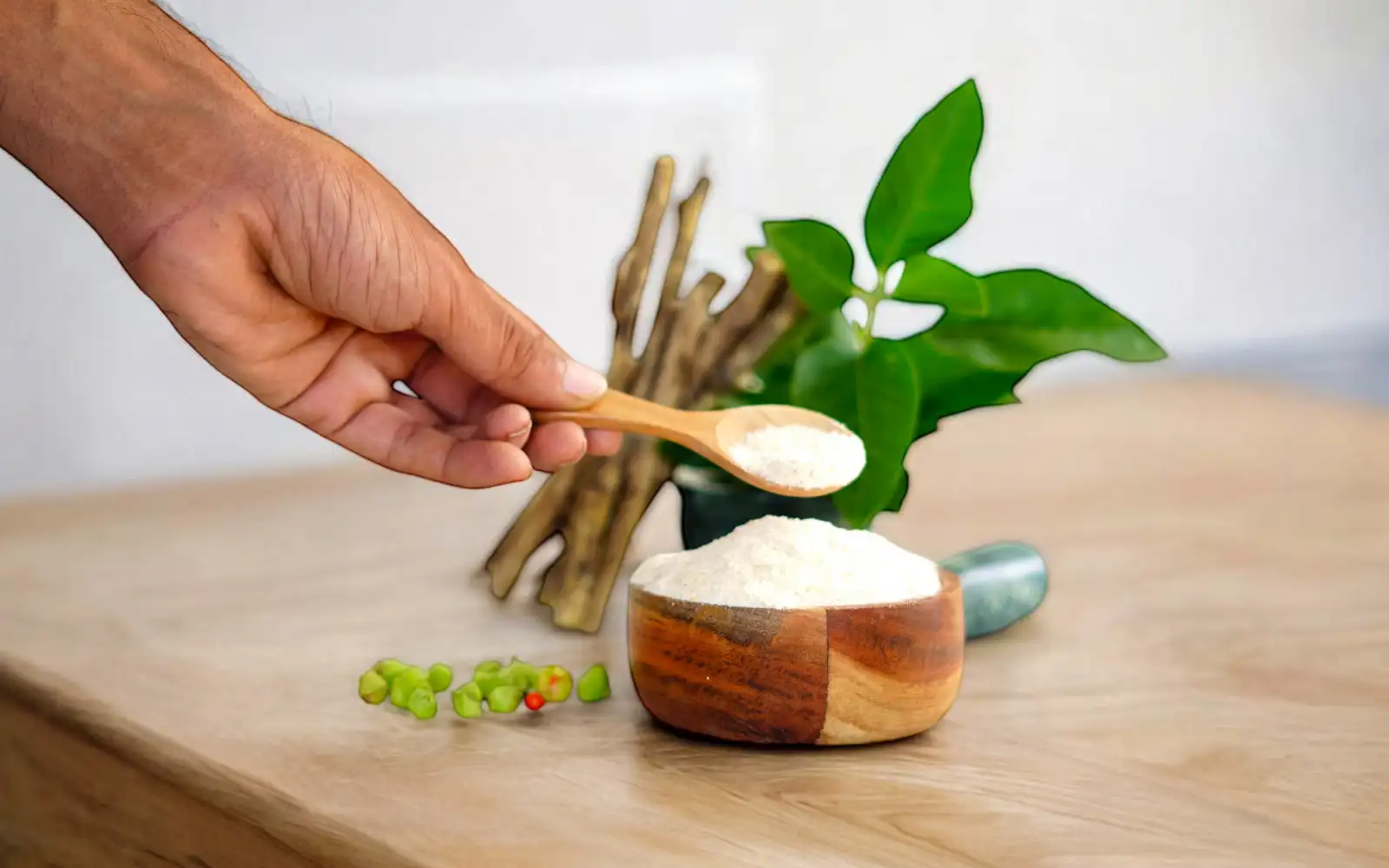For more than 8,000 years, Ayurvedic practitioners in India have relied on the healing properties of a powerful root to address a wide range of health concerns. Ashwagandha, one of the most prominent adaptogens in traditional Ayurvedic medicine, has been used both internally and externally to support mental and physical well-being. Today, it continues to attract interest for its potential benefits, including its impact on hair health.
Also known as “Indian winter cherry” or “Indian ginseng,” ashwagandha is made from the root of the Withania somnifera plant. The powdered extract is believed to increase energy, reduce inflammation, calm the nervous system, and strengthen the body’s natural defenses. The name itself refers to the distinctive horse-like smell of the root (“ashwa” means horse) and to the idea that its consumption can provide horse-like vitality and strength.
Stress is one of the most common causes of thinning hair and hair loss. By lowering cortisol levels and helping the body cope with stress, adaptogens like ashwagandha may help prevent or slow down hair loss triggered by emotional or physiological stress. Ashwagandha may also reduce inflammation, which can worsen various health issues, including scalp conditions and hair follicle weakness. Although this herb has been used for centuries, scientific studies on the effects of ashwagandha on hair loss are still ongoing.

How Ashwagandha Benefits Hair
Ashwagandha is rich in powerful antioxidants, amino acids, and bioactive compounds that help strengthen hair follicles and increase resistance to damage. As an adaptogen, it supports the body during stress by lowering cortisol levels, which play a key role in stress-induced hair shedding and weakened follicle activity. Under chronic stress, the body prioritizes survival functions and temporarily reduces energy for non-essential processes like hair growth and repair. By balancing inflammatory responses and calming the nervous system, ashwagandha promotes a healthy internal environment that can positively influence hair growth and overall well-being.
In addition, this plant may support better blood circulation and metabolic activity, delivering more nutrients to the scalp and encouraging the growth of stronger, denser, and shinier hair. When taken regularly and as recommended by a specialist, ashwagandha may help restore hair naturally, reduce breakage, and prevent premature shedding. However, it is important to emphasize that while ashwagandha has promising potential, it should not be used as the sole treatment for hair loss, as clinical evidence remains limited.
Which Hair Types Can Benefit from Ashwagandha
Experts agree that ashwagandha can be beneficial for all hair types and textures. Whether your hair is straight, wavy, curly, thick, or fine, it is vulnerable to stress and internal or external imbalances such as hormonal fluctuations, fatigue, emotional tension, poor sleep, and environmental damage. Ashwagandha helps regulate stress responses, support hormonal balance, and improve scalp condition. This makes it a universal option for strengthening hair follicles and supporting scalp health regardless of individual characteristics.
How to Use Ashwagandha for Hair Support

When taking ashwagandha for hair health, it is important to understand that it is not a quick-fix product. Visible changes may require time, consistency, and regular use.
Internal Use for Hair Growth and Stress Reduction
The most popular way to take ashwagandha is in capsule or powder form. It can support thyroid function and improve sleep quality, both of which are essential for proper cellular repair and healthy hair growth. A typical regimen includes one to two capsules of 300–500 mg daily, or about half a teaspoon of powder dissolved in water, coffee, or another beverage. With consistent intake, ashwagandha may strengthen hair roots and slow down stress-related hair loss. Before beginning supplementation, it is important to check for contraindications, since ashwagandha is not suitable for everyone.
Topical Use to Strengthen Hair Roots
Ashwagandha can also be applied topically as a mask or oil, or mixed into shampoo. When blended with coconut or castor oil and gently massaged into the scalp, the herb's active compounds may boost blood circulation and reinforce follicle strength. The mixture can be left on the scalp for 30–60 minutes before washing with shampoo. Some people also mix a small amount of powder into their shampoo or conditioner for an extra toning effect and improved softness.
Conclusion: Ashwagandha as a Natural Hair-Strengthening Aid
Ashwagandha is a traditional Ayurvedic ingredient with promising potential for supporting hair and scalp health. Thanks to its adaptogenic and anti-inflammatory properties, it may help reduce stress – one of the most common triggers of weakened hair and hair loss. With regular and responsible use, ashwagandha may help strengthen hair follicles, improve scalp nourishment, and support the growth of thicker and stronger hair.
However, ashwagandha is not a miracle cure and does not work overnight. It delivers the best results when used as part of a holistic approach that includes a balanced diet, a healthy lifestyle, proper hair care, and consultation with a healthcare professional when needed. For individuals seeking to support their hair from within, enhance stress resilience, and improve overall well-being, ashwagandha can be a valuable addition to a wellness routine, provided proper dosage and potential contraindications are considered.
Many ashwagandha hair loss experiences shared online report positive results, particularly in cases linked to stress. Still, responses vary from person to person, and in rare cases there may be hair loss from ashwagandha due to individual sensitivity or improper use. Ashwagandha for hair loss can be helpful, but as with all supplements, mindful use and professional guidance offer the best outcome.


